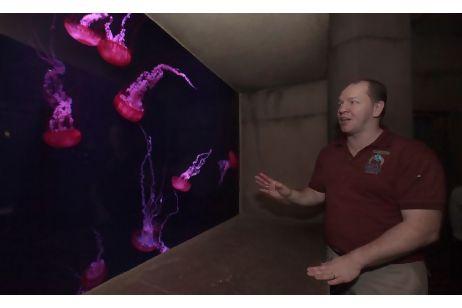DUBAI // Dennis Blom bought his first goldfish when he was four, and it was love at first sight.
He never names his fish, but he loves all sea creatures, big and small.
Today he cares for more than 65,000 as the manager of the Lost Chambers aquarium at Atlantis, The Palm.
A big man, at 1.96 metres tall, Mr Blom spends his days with the sea’s tiniest creatures. He nurtures newly-hatched sea horses, stingrays and jellyfish smaller than a child’s fingernail.
At the Lost Chambers his daily jobs include cleaning the piranha exhibit, hand-feeding stingray pups and propagating coral.
He is a caretaker with a soft spot for sharks, rays and sea urchins. He sees the vertical migration of the aquarium’s jellyfish as “majestic” and its Queensland groupers, frowning brown fish that grow to 500 kilograms, as “beautiful”.
“Very much all the fish are my favourite,” says Mr Blom, a Dutchman. “Every fish has its own favourite thing. They’re all very beautiful. Even some ugly fish are very beautiful. Why? Because they’re so ugly.”
He says he is immune to jellyfish stings and insists that piranhas are timid and misunderstood.
“Later on I will be diving in this tank,” says Mr Blom, pointing to a tank of red-bellied piranhas.
“I’m not scared at all. Piranhas are not at all aggressive. Nobody really, badly, got injured by piranhas in the last 30, 40 years.
For them, I’m a really big, like, dinosaur.”
He begins each day at 7am, inspecting the aquarium’s 21 tanks. This week he is waiting for one of the male sea horses – the males incubate the eggs of the species – to give birth. His favourite days are those when fish are born.
“When you get the birth of a fish, that makes everything happy,” Mr Blom says.
“When the fish are happy, everything looks beautiful.”
The only creature among the 250 species at the Lost Chambers of which he does not speak with obvious admiration is the lobster. He and his staff are responsible for a tank of 600. “Always moulting,” he says.
As a child, Mr Blom transformed his bedroom into a subtropical paradise of “aquarium tanks and palms and fish” and, in his teen years, snakes, frogs and geckos.
“I’m slightly also a herpetologist. I did poisonous frogs for eight years.”
At 11, he rescued sick fish from the local pet shop and experimented at home with different cures.
By 20, he was hired at Burgers’ Zoo in Arnhem in the Netherlands, and later by the Great Barrier Reef Marine Park Authority in Australia.
Mr Blom arrived at Atlantis, The Palm in 2008 when most of the tanks were still empty and the fish quarantine area was full of new arrivals.
Today, he is one of 46 people who work around the clock to clean, feed and nurture the fish at the Lost Chambers.
Visitors enter a colourful maze of aquariums that tells a mythical story of Atlantis but most of the work happens behind the scenes, in Mr Blom’s office or behind a door with a small sign that reads, “fish quarantine”. This is the fish hospital for the sick, the newly arrived and newborns who are too small to manage in the big tanks.
“Like sea horses,” Mr Blom says. “So small they’ll go down the drain and we don’t see anything.”
A small tank with a sandy bottom is a nursery for juvenile rays. A tank of sea horses born in November and December sits on the shelf above.
An adult sea horse weighs about 20 grams. These are much smaller and ravenous, fed on a constant diet of fresh brine shrimp.
Another shelf in the lab holds a series of clear plastic tanks filled with polyps and translucent jellyfish so small they are all but invisible.
The hope is that the aquarium will raise awareness of the Arabian Gulf's rich marine life and help to revive life in the local waters.
Mr Blom has started with the basics.
There are now 10 artificial reefs in a protected area off The Palm Jebel Ali that are seeded with coral from the Lost Chambers.
Coral is growing at a rate of 12 to 16 millimetres a month. This will create new habitats for the fish to live and breed in.
Sea horses have been released in the area’s seagrass.
Most fish are here to stay and Mr Blom wants them to be comfortable.
“Hotel guests are checking out,” he says.
“Those fish are not checking out. They’re always there, they’re always our guests. If they check out it’s not good.”






